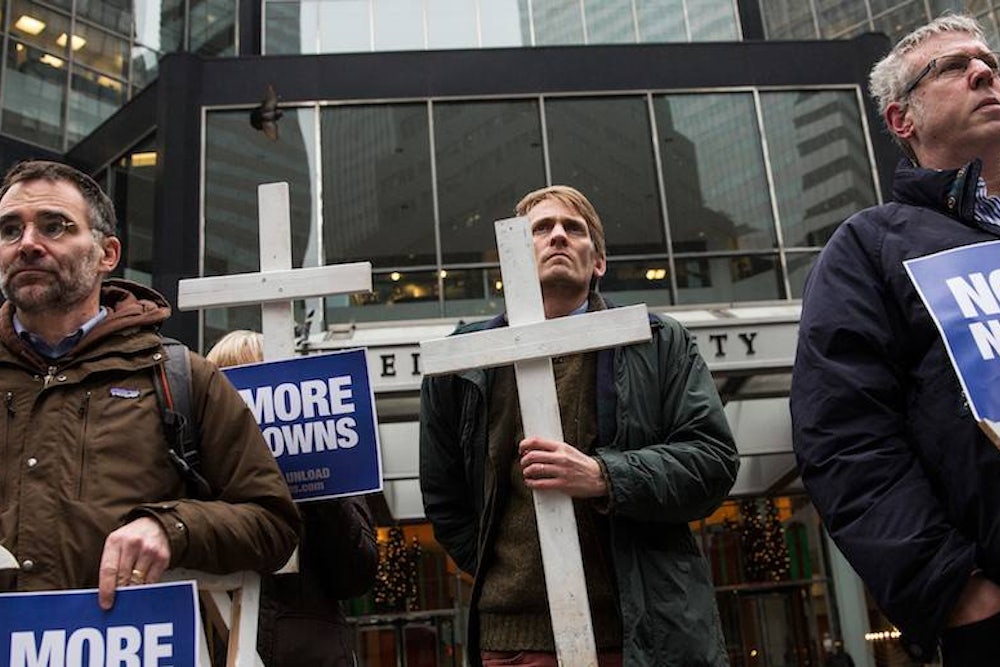The country is braced for the anniversary of the Sandy Hook Elementary massacre, which falls this Saturday, a marker that is all the more heavy for the fact that so little has happened on a nationwide level to address gun violence in the year since the killings. But it’s worth noting that as the legislative track to national reform sits stalled, there are signs of movement on another front: divestment.
Proponents of sensible gun control are increasingly turning to the approach used to such effect against apartheid South Africa and the tobacco industry and more recently also deployed against the fossil fuel industry. They are trying to force change by pressuring gun manufacturers themselves and, more specifically, the people, firms and institutions that invest in them. This shift is out of recognition that the manufacturers not only profit from the spread of firearms but have become increasingly central to the National Rifle Association and other groups that fight new gun regulations.
The first target of the main pro-divestment group, Campaign to Unload, is Cerberus Capital Management, the private-equity firm that owns the Freedom Group, the big gun conglomerate that makes, among many other brands, the Bushmaster .223 semi-automatic rifle that Adam Lanza used to gun down 20 children and six educators in Newtown (The company is also known as Remington Outdoor Company). Campaign to Unload held an inter-faith protest outside Cerberus’ headquarters on Monday and plans much more in the weeks ahead. “When the political process becomes stalled, stigmatizing the industry helps loosen up the process,” said Jennifer Fiore, a Washington, D.C. resident who recently joined Campaign to Unload after helping lead Moms Demand Action, a nationwide group that sprang up after the Newtown shootings and now counts more than 120,000 members online. “Manufacturers are part of the problem, part of the reason why legislation has stalled, and we’d like to see the manufacturers and industry as a whole embrace what the public would like to see.”
It’s easy to scoff at such an effort in its fledgling stages. Why ever would the industry allow pressure to influence it when it has so much money at stake? After all, even a modest step such as expanding background checks for gun buyers—the primary goal of the legislation that was blocked in the Senate—cuts into profits by foreclosing thousands of potential customers. Then there’s the practical fact that some prominent gun makers—such as Glock, Sig Sauer and Beretta—aren’t even based in this country.
But before you dismiss the effort too quickly, consider that divestment is most definitely a concern of Cerberus itself. Very soon after the Newtown massacre, the giant California teacher retirement fund announced that it was putting its Cerberus stake under review. This was closely followed by Cerberus’s announcement that it was putting Freedom Group up for sale. A few weeks later, Chicago Rahm Emanuel announced that the city was pulling its investments in any and all gun manufacturers.
A year later, Cerberus has been unable to find a buyer, but this week it made clear that it was making a big move anyway:
Instead of selling the company, executives from the Freedom Group explained on Monday during a conference call with about 35 creditors that Cerberus was working on a new step: helping its investors who were seeking to distance themselves from the industry sell their interests in the firearms maker.
The decision highlights the rocky sales process that Cerberus began last December. Despite hopes for a quick sale, the potential buyers backed away and some lenders declined to finance bids.
The proposal outlined on Monday, in which a new investor would take a minority stake and provide $200 million in new debt, would be only an interim step in Cerberus’s efforts, people briefed on the matter insist. The firm may still pursue a sale, an initial public offering or some other transaction afterward — or instead of — the recapitalization.
It sure looks as if the divestment campaign’s initial goal—to, as Fiore put it, make Freedom Group a “hot potato”—is working. Who knows what comes next, but presumably future targets would include major publicly traded gun makers such as Smith & Wesson and Sturm, Ruger & Company. (Fiore says her group is aware of 10 hedge funds and private equity firms that have pulled their stakes in publicly-traded gun makers.) Investors pressured to divest will face a touch choice, given how well gun makers’ stock has performed this year, driven by the surge in sales that followed Newtown, as gun owners emptied shelves in anticipation of new regulations (though the surge has abated in recent months). Smith & Wesson, for one, has seen its stock rise 26 percent since the day before the Newtown shootings, roughly in line with the S&P 500.
But as Fiore and others see it, that stock surge and the gun makers’ fueling of resistance to sensible reforms are very much linked. “Their obstructionism has created profits,” she said, “and we believe those profits are blood money.”
